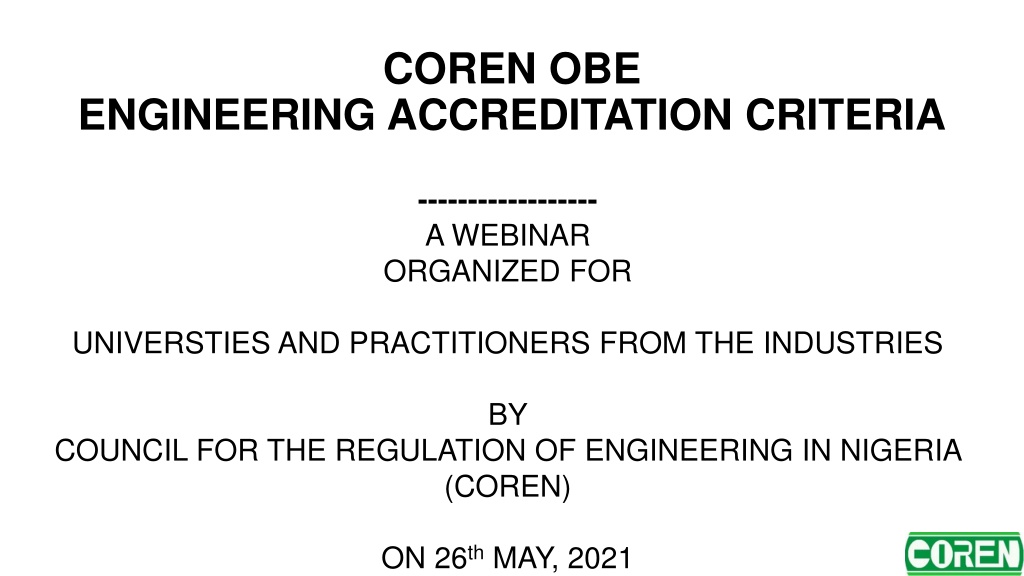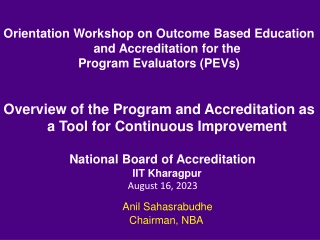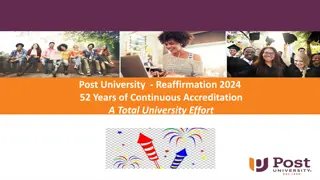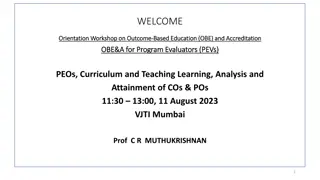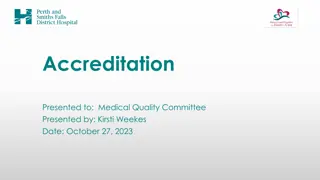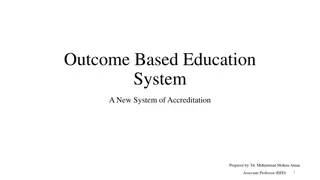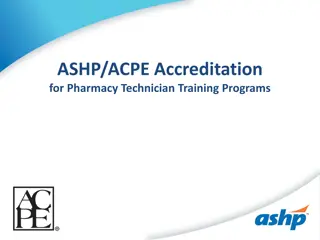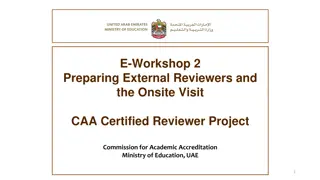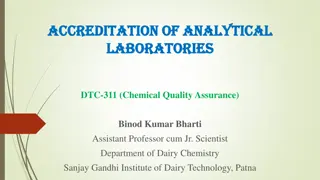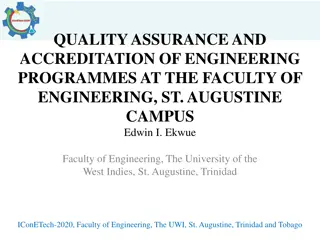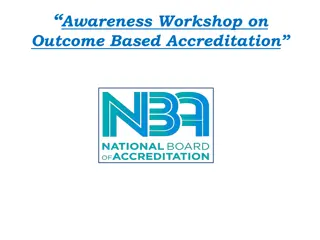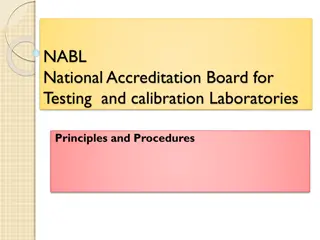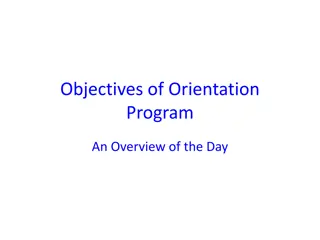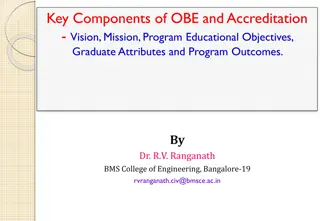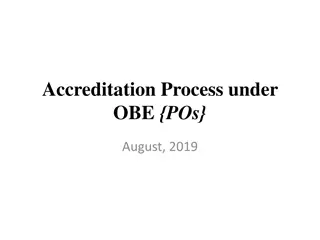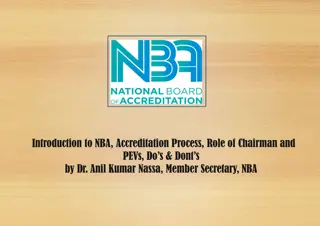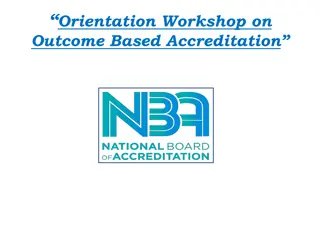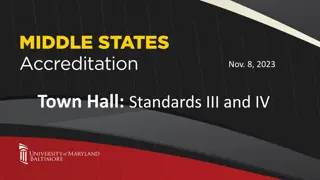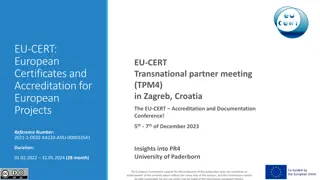Understanding COREN OBE Engineering Accreditation Criteria
In a recent webinar organized by the Council for the Regulation of Engineering in Nigeria (COREN), the focus was on exploring the Engineering Accreditation Criteria, specifically the Outcome-Based Education (OBE) framework. Participants learned about the key components including Programme Educational Objectives, Programme Outcomes, Course Learning Outcomes, Curriculum, Continuous Quality Improvement, Staffing, Infrastructure, and more. The webinar aimed to highlight the differences between the current accreditation procedure and the proposed OBE approach, equipping universities and industry practitioners with a better understanding of the standards required for engineering education in Nigeria.
Download Presentation

Please find below an Image/Link to download the presentation.
The content on the website is provided AS IS for your information and personal use only. It may not be sold, licensed, or shared on other websites without obtaining consent from the author. Download presentation by click this link. If you encounter any issues during the download, it is possible that the publisher has removed the file from their server.
E N D
Presentation Transcript
COREN OBE ENGINEERING ACCREDITATION CRITERIA ------------------ A WEBINAR ORGANIZED FOR UNIVERSTIES AND PRACTITIONERS FROM THE INDUSTRIES BY COUNCIL FOR THE REGULATION OF ENGINEERING IN NIGERIA (COREN) ON 26th MAY, 2021
Outcomes of the Webinar At the end of this webinar, participants are expected to: 1. understand COREN OBE Engineering Accreditation Criteria. 2. explain in detail the major differences between the present COREN Accreditation procedure and the proposed OBE Accreditation.
SECTION A- COREN OBE ENGINEERING ACCREDITATION CRITERIA
OBE ENGINEERING ACCREDITATION CRITERIA 1. Programme Educational Objectives (PEOs) 2. Programme Outcomes (POs) 3. Course Learning Outcomes (CLOs) 4. Curriculum and Learning Process 5. Students 6. Continuous Quality Improvement (CQI) 7. Staffing 8. Physical Facilities and Infrastructures 9. Institutional Linkage and Community Services 10.Institutional Support and Funding
Criterion 1: Programme Educational Objectives What is expected a few years (say 3- 5 years) of graduation (What the programme prepares graduates in their career and professional accomplishments)
Criterion 2: Programme Outcomes What attributes (Knowledge, Skill and Attitudes) students should have by the time of graduation COREN s 12 POs are identical to that of WA
COREN BMAS Programme Outcomes A graduate of an engineering programme to be accredited by COREN is expected to have ability in: 1. Engineering Knowledge 2. Problem Analysis 3. Design/Development of Solutions 4. Investigation 5. Modern Tool Usage 6. The Engineer and Society 7. Environment and Sustainability 8. Ethics 9. Individual and Team Work 10.Communication 11.Project Management 12.Lifelong Learning
Criterion 3: Course Learning Outcomes What attributes (Knowledge, Skill and Attitudes) students should have during or by the end of a course
Criterion 4 Curriculum and Learning Process 1. 5-year, 10-semester programme (UTME students). 2. 4 & 3 year for Direct Entry Students. 3. Minimum Fifteen (15) weeks of teaching, excluding time of examination(s) 4. The general framework defined by National Universities Commission (NUC) Curriculum Guideline and COREN BMAS (2017). 5. Industrial training programme 6. Laboratory work 7. Design projects 8. Final year project 9. Assessment of learning outcomes
Criterion 5 - Students 1. Admission criteria 2. Annual intake 3. Admission response 4. Transfer of students 5. Academic counseling 6. Class size (theory) 7. Class size (practical) 8. Participation in competition 9. Semester academic load 10. Completion of courses and student feedback 11. Student performance evaluation 12. Career and student wellness counseling
Criterion 6Continuous Quality Improvement (CQI) Assessment Assessment Assessment Evaluation Evaluation Evaluation PEOs POs CLOs Stakeholders Mission & Vision CQI CQI CQI 11
Criterion 7Staffing 1. Academic Staff strength 2. Full-time dedicated Academic Staff 3. Shared Academic Staff 4. Visiting Academic Staff 5. Academic Staff qualifications 6. Student/faculty ratio 7. Staff training & mentoring 8. Staff Retention, Development and Career Planning 9. Pyramid of Academic Structure 10.Staff workload 11.Staff Research & Publications
Criterion 8Physical Facilities and Infrastructures 1. Adequate teaching and learning facilities such as classrooms, learning- support facilities, study areas, information resources (library), computing and information-technology systems, laboratories, workshops, and associated equipment to cater for multi-delivery modes. 2. Adequate of support facilities such as hostels, sports and recreational centres, health care centres, student centres, and transport in facilitating students life on campus and enhancing character building.
Criterion 9: Institutional Linkage and Community Services 1. Opportunities to students for training, consultancy, R&D and exposure to professional practices. 2. Students are expected to undertake assignments from industry to provide solutions to complex engineering problems. 3. Students and Staff are encourage to establish collaboration for R&D and product development related projects, with due regard to environmental and societal impact. 4. Feedback from the industry and employers is crucial and an essential part of curriculum review process used to evaluate attainment of the programme objectives and educational objectives.
Criterion 10: Institutional Support and Funding 1. Financial resources and their commitment to support an engineering programme. 2. Adequacy of these resources in sustaining the program, with a view to its up- gradation and future enhancements
SECTION C: DIFFERENCES BETWEEN THE PRESENT COREN ACCREDITATION PROCEDURE AND THE PROPOSED OBE ACCREDITATION.
1:Programme Outcomes and Educational Objectives Different Accreditation Criteria: PEOs, POs and CLOs Development of PEOs and CLOs with involvement of all Stakeholders Adoption of POs. Assessment, Evaluation and Review of Programme Outcomes and Educational Objectives periodically. Considering the societal needs (soft skills such as creativity, problem solving, team work, management and Entrepreneurial skills, decision making. Evidence of involvement of all Stakeholders in the development, Assessment, Evaluation and Review of Outcomes and Objectives.
EMPLOYABILITY AND QUALITY OF EDUCATION Detoun Ogwo (2010) reported a survey on youth employability based on completed questionnaires by 91 Human Resources Managers and Personnel from selected network of companies and the results are as follow: 48 % of employers rated young graduates poor in conceptual and creative thinking 44 % of employers rated young graduates poor in self-awareness 39.6 % of employers rated young graduates poor in time management 36 % of employers rated young graduates poor in global and commercial awareness 34.1 % of employers rated young graduates poor in sense of career direction
EMPLOYABILITY AND QUALITY OF EDUCATION 34.1 % of employers of employers rated young graduates poor in emotional intelligence 39.1 % of employers of employers rated young graduates poor in managing school to work transition In conclusion, the data above confirmed that: There is a gap between teachings in tertiary institutions and meeting the skills set demands of industries. Students should be empowered with life-skills required to navigate through life. There is the urgent need to restructure existing curricula to support employers demands and promote conceptual and creative thinking, self-awareness, sense of career direction and emotional intelligence.
2. Mapping and Attainment of CLOs,POs and PEOs Linking Topics to Programme Educational Objectives (PEOs) Topics lead to learning objectives Group/individual learning objectives lead to course outcome Course outcomes must relate to programme outcomes Programme outcomes must address the Programme Educational Objectives (What kind of engineers to produce?) Determination of CLOs, POs and PEOs attainment levels
3: Setting up of Industrial Advisory Board/Committee for the Programme Development of Industrial project to Improve student competence in communication, teamwork, and project management. Formulation of Design course to address industrial needs. Encourage students to participate in industrial discussions and fora, professional practice exposure, and collaborative projects / research for the solutions to engineering problems. Participate in students activities and involvement in student organizations to provide experience in management and governance, representation in education and related matters and social activities. Participate in the development/ review of PEOs, evaluation of the level of achievement of the PEOs and POs. Provision of additional support to sustain and enhance the quality of the programme.
4: Involvement of more stakeholders in the development, assessment, evaluation and reviewing of Programme Outcomes and educational Objectives to meet the needs of the society at a given attainment levels.
5: Continuous Quality Improvement (CQI): A new criterion P P E E O O P P O O CL CL O O PLAN PLAN Establish Establish Objectives/Outcomes Objectives/Outcomes Design learning/content Design learning/content Make Assessment Make Assessment ACT ACT Adjust Plan Adjust Plan Adjust Delivery Adjust Delivery Adjust Assessment Adjust Assessment criteria criteria Syllabus/ Curriculum Syllabus/ Curriculum Exam, Project, Survey etc. Exam, Project, Survey etc. CQI CQI DO DO CHECK CHECK Lecture, Lab, Tutorial Lecture, Lab, Tutorial Analyze of data Analyze of data Propose Improvements Propose Improvements Deliver Deliver Exam, Test, Quiz, Report, Exam, Test, Quiz, Report, Presentation Presentation Assess Assess Document Document Course File Results Course File Results Analysis & Evaluation of CLO, Analysis & Evaluation of CLO, PLO attainments and results of PLO attainments and results of Survey data Survey data 24
6. Definition of Key Performance Indicators (KPI) for each Accreditation criterion. KPI is a measurable value that demonstrates how effectively a Programme is achieving Key Outcomes and Objectives. Organization uses KPIs to evaluate their success at reaching targets (Outcomes and Objectives) Outcome to measured : Good Teamwork Students are able to demonstrate: 1. Positive contribution to the team project (minutes of meeting) 2. Well prepared and participate in discussion(observation) 3. Volunteer to take responsibility 4. Prompt and sufficient attendance 5. Aplomb (Composure) and decorum (Modesty)
7. Training of Accreditation evaluators in line with international best practices. 8. Qualifying Requirements for COREN Accreditation visit: Development and submission of Self-Assessment Report (SAR) to COREN at least 6 months before the expiration of the present Accreditation status. This shows the readiness of the programme for Accreditation visit. 9. Development of OBE scoring software for mapping and Assessment of Programme Outcomes and Educational Objectives.
10.Measurements of OBE Accreditation visit will be in terms of Concern Weakness Deficiency Compliance and Opportunity for improvement. 11.Opportunity to appeal the outcomes of COREN Accreditation visit. 12.Development of COREN OBE Accreditation Manual, 2019
13. Institutional Linkage and Community Service as a criterion and core requirement for Accreditation Industrial collaboration and linkages programme Promotes Industrial and Universities relationship Feedback from the industry and employers is crucial and an essential part of curriculum review process used to evaluate attainment of the PEOs. Opportunity for Staff to contribute to the development of their immediate community and the nation through community service, projects within and outside the Universities.
REFERENCES COREN OBE Accreditation Manual (2019) Outcome-based education, Wikipedia, (http://en.wikipedia.org/wiki/Outcome- based_education). TOWARDS EAC ACCREDITATION IN 2009 - Direct Assessment of Program Outcomes, Fakulti Kejuruteraan Elektrik, Universiti Teknologi Malaysia (http://encon.fke.utm.my/OBE.ppt). T. A. Grossman, Shifting the Focus from Teaching to Learning: Learning Objectives for OR Course Design, Masagung School of Management, University of San Francisco (http://meetings.informs.org/TMSWorkshop/TMS04/presentations/Grossman.ppt). S. S. Chong, Outcome-based Education (OBE), 2008, UTAR (http://www.utar.edu.my/fes/file/OBE.pdf). B.K.Chung, Outcome-based Education (OBE), 2009, Faculty of Engineering and Science, UTAR (http://www.utar.edu.my/fes/file/OBE%20Presentation.pps). 29
The End Q & A 31
